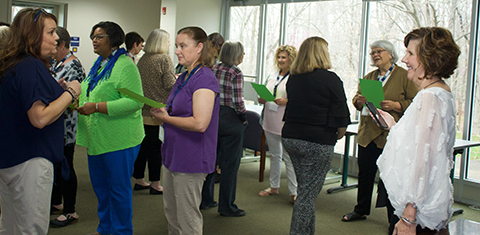Breaking Educational Barriers in P-3
(Pre-K through 3rd Grade) Education
2022 has been an exciting year for the Region 6 Comprehensive Center (RC6) and particularly for the Early Childhood project. Carla Garrett, SERVE’s Early Childhood Program Specialist, leads the project, which focuses on providing equitable student access to high quality learning environments. The early childhood project aims to improve educational policies, practices, and strategies by enriching early childhood educators’ best practices that will lead to positive P-3 outcomes.

The project’s central focus is to improve equitable school experiences for North Carolina’s youngest learners. Part of this comprehensive project included the RC6 providing support, resources, leadership, and mentoring for the first North Carolina cohort’s participation in the P-3 Leadership Certificate program, created and implemented by Dr. Kristie Kaurez, an associate clinical professor at the University of Colorado Denver.
March marked the graduation of Cohort 1 from the P-3 Leadership Certificate Program. Cohort 1 comprised 13 early childhood leaders from across the State – one leader from the North Carolina Department of Public Instruction (NCDPI), and three expert facilitators.

George Hancock, the Executive Director of the SERVE Center and the Co-Director of the RC6, offered his insights into the work the RC6 is doing to support the continued efforts of North Carolina’s P-3 Leadership Certificate Project.
Having worked at multiple levels in North Carolina education, including instruction, administration, technical assistance, policy development, and inter-organizational collaboration, George began his career as a teacher and principal, and has been a district-level federal programs administrator and state coordinator for School Improvement Grants.
While working in schools, he saw the positive impact that early childhood education can have on a young child. “I was fortunate to work with solid Pre-K teachers and saw what that could do for children in a local community.”
George recalls that at times; however, some policies and programs have created unintentional barriers for early childhood educators, such as lack of training opportunities, resources, and government funding. Concerning is the impact a lack of attention to early childhood education could have on the developmental stages of North Carolina’s youngest learners. “Without the attention, we’re going to be in danger of losing out on an incredible opportunity to change the lives of these young children.”
He credits the work of the RC6 team, particularly those working with the P-3 Leadership Certificate Project, with the opportunity to help break down educational barriers. Initiating “the project was an opportunity to say we know the right things to do for children.” He believes the RC6 team that helped implement the P-3 Leadership Certificate Project knows the work, has the experience, and has done the research to help put those pieces into place to positively impact P-3 education. “What we wanted to do with this early childhood work was to build it from the grassroots level.”
The process was to engage teachers, principals, and district representatives and have their voices play into the work.”
George Hancock
“We’ve developed a white paper of best practices that includes what we know can work for young children.” Children Come First: Ensuring School Policies, Practices, and Strategies Lead to Positive Third Grade Outcomes uses research-based strategies that ensure school policy, practices, equity, and strategy lead to positive third-grade outcomes. The P-3 Leadership Project participants take this knowledge back to their early childhood classroom environments with an intended outcome for educational leaders to apply the knowledge gained in the program back in the classroom. The goal is to help North Carolina’s early childhood educators eliminate achievement gaps associated with equity, literacy, and mathematics.
George agrees that policies coming down from the State that focus on end-of-grade assessments must be in place to improve academic achievement outcomes. “These assessments are no doubt important to track the progress of students.” He added, “While the academic focus is essential, it is equally important to focus on the developmental stages of young children.” Believing positive student outcomes involve a systems approach supporting teachers and school administrators, he noted, “This framework is critical to breaking down some barriers and meeting people where they are.”
Acknowledging that with the onset of the pandemic that it has never been a more challenging situation in the schools and district, he reflected, “I don’t think it’s ever been more difficult to be in a school, a classroom, or a school district for various reasons.” However, he is confident that despite the current challenges faced within schools and districts, people in classrooms, all the way up to the state level, are still working hard for children. He stated, “We must accept those challenges, and when putting policies in place, we must remember that we are dealing with real people.”
George wants to keep the momentum that the RC6 has initiated in breaking educational barriers by expanding the work started in the first year of the North Carolina P-3 Leadership Certificate Project to more educators across the state. He summed up his thoughts on early childhood education, concluding, “We must get this one right, not just with our P-3 leader-ship group, but across the state and country.”
Story: Sana Silvera-Roy, Communications Specialist, SERVE
Photos: Curtis Burgins, Communications Specialist, SERVE





